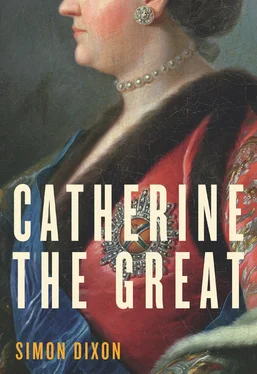* * *
The extraordinary correspondence into which Catherine and Sir Charles entered over the summer of 1756, while Stanislaw Poniatowski had temporarily been recalled to Poland, gives us the first incontrovertible sign of her maturing political aspirations. By her own subsequent account, Catherine survived the years of misery she suffered as Peter’s consort through ‘ambition alone’, sustained by a pervading sense of destiny—‘a je ne sais quoi that never left me in doubt for a moment that sooner or later I should succeed in becoming sovereign empress of Russia in my own right’. 44It seems unlikely that such ambitions were very far developed when she first arrived from Zerbst. Although she claimed quickly to have mastered the blacker arts of the Court, she can hardly have ‘learned many things’ by feigning sleep during her illness in 1744 because at that time she knew scarcely any Russian. There can be no doubt, however, that, in contrast to her husband (a gossip ‘as discreet as a cannon-ball’), Catherine soon learned to keep her own counsel while redoubling her efforts ‘to gain the affection of everyone, both great and small’. Widely suspected of being a Prussian agent, she understandably claimed to have been no more than ‘a very passive spectator’ of the great debates on foreign policy when she first arrived in Russia—‘very discreet and more or less indifferent’ was how she later described herself. 45Nevertheless, the frequency of her contact with foreign diplomats gave her plenty of opportunities to develop her political antennae. One of the longest entries in the Complete Collected Laws of the Russian Empire describes the ceremonial by which foreign ambassadors presented their credentials to the tsar. 46Peter and Catherine had a crucial part to play in these audiences and often found themselves in the company of the ambassadors, not only at regular Court reception days, but also on state occasions. While Elizabeth, ‘dressed in her regimentals’, chose as usual to dine with her intimates at the banquet on Catherine’s name day in 1751, it was the grand duchess and her husband who entertained the great officers of the crown and the foreign ministers. 47
By then, Catherine had become involved in complex (and ultimately fruitless) negotiations over Peter’s Holstein possessions. The Holsteiners were represented by the Danish envoy, Count Lynar, a burly redhead with a penchant for lilac and flesh-pink clothes who took such great care of his complexion that he was reputed to wear gloves and face cream in bed. (Lest such behaviour be mistaken for effeminacy, Lynar was swift to boast of his eighteen children, claiming that he had always prepared their wet nurses by getting them pregnant too.) 48To practical experiences such as these, Catherine added further intellectual reflection. In her self-imposed seclusion after the birth of her son, she read more seriously than ever before. This, it seems, is when she first tackled Montesquieu’s Spirit of the Laws , the eighteenth century’s greatest work of political philosophy, which was later to be the main inspiration for the Instruction ( Nakaz ) she presented to the Legislative Commission she summoned in 1767. She also immersed herself in the Annals of Tacitus, and since no reader of Tacitus in Elizabeth’s Russia could fail to hear the contemporary echoes of the Praetorian Guards’ role in deciding the fate of the Roman emperors, his book produced ‘a singular revolution’ in Catherine’s mind. ‘Aided perhaps by my depressed state of mind at the time, I began to see many things in black and searched to find deeper causes for the various events which presented themselves to my sight.’ 49
There was scarcely any limit to her ambitions in the summer of 1756, when she was openly prepared to contemplate the consequences of the empress’s demise. Already on 11 August, Catherine’s head was ‘a jumble of intrigues and negotiations’. A week later, she confided to Sir Charles her remarkable ‘dreams’:
After being alerted [to Elizabeth’s death], and being certain that I am not mistaken, I shall go straight to my son’s room. If I meet, or can quickly get hold of, the Grand Master of the Hunt [Aleksey Razumovsky], I shall leave the boy with him and the men under his command. If not, I shall carry him off to my room. I shall also send a man that I can trust to warn five officers of the Guards of whom I am sure, who will each bring me fifty soldiers (this is arranged at the first signal), and though perhaps I may not use them, they will follow me as a reserve in case of difficulty. NB that they will take no orders except from the grand duke or me. I shall send orders to the Chancellor [Bestuzhev], [General] Apraksin and Lieven to come to me, and meanwhile I shall enter the death chamber, where I shall summon the captain of the guard, and shall make him take the oath and keep him at my side. I think that it would be better and safer if the two grand dukes [Peter and Paul] were together, than if only one went with me; also that the rendezvous for my followers should be my ante-chamber. If I see any commotion, or even the slightest signs of it, I shall secure, either with my own people or with those of the captain of the guard, the Shuvalovs and the Adjutant General of the day. Add to that the fact that, the lower ranking officers of the Life Guards are trustworthy; and though I have had no communication with all of them, I can count sufficiently on two or three, and on having enough means at my disposal to make myself obeyed by everyone who is not bought. 50
This astonishing letter was followed by a stream of others scarcely less frank, in which Catherine commented in characteristically ironic fashion on everything from Elizabeth’s failing health to the plans for Russian troop movements. (As her ‘dreams’ revealed, she was friendly with the Russian commander-in-chief, General Apraksin, and attempted to persuade him on Sir Charles’s behalf to oppose the resumption of diplomatic relations with France.) ‘I do not know what I am saying, or what I am doing,’ she confessed on 11 September, ‘I can truly say that it is the first time in my life that this has happened to me.’ Hardly able to believe what he was reading, Sir Charles coaxed her into further indiscretion in terms quite outside the normal diplomatic lexicon:
One word from you is my most sacred law. When I think of you, my duty to my Master [George II] grows less. I am ready to carry out all the orders you can give me, provided they are not dangerous to you; for in that case I shall disobey with a firmness equal to the obedience with which I would carry out all others…I am yours, yours alone, and all yours. I esteem you, I honour you, I adore you. I shall die convinced that there was never a sweetness, a soundness, a face, a heart, a head, to equal yours.
Not to be outdone, the grand duchess replied in kind: ‘My head is splendid, when it has one like yours to think for it.’ 51
* * *
So long as Elizabeth stubbornly confounded predictions of her demise, there was no opportunity to test the power of such fantasies. Instead, Catherine had to cope with the changed circumstances in which Stanislaw Poniatowski made his long awaited return to St Petersburg in January 1757. In that same month, despite all Sir Charles’s efforts to prevent it, Russia entered the Seven Years’ War against Prussia on the side of France, Austria and Saxony, for whom Stanislaw was charged with securing Russian military aid. Since England was Prussia’s informal ally, it was no longer possible for the young Pole to consort openly with his mentor, who, amid the debris of his failed diplomacy, was already beginning to show signs of the mental derangement that would kill him two years later. Sir Charles was recalled to London in July. By then, however, Stanislaw’s love affair with Catherine had resumed in all its passion. Indeed, she was already four months pregnant with his child.
Читать дальше












